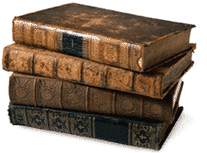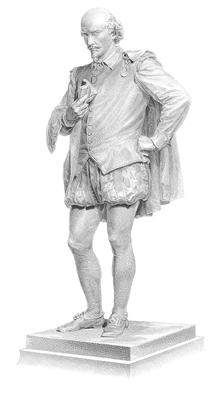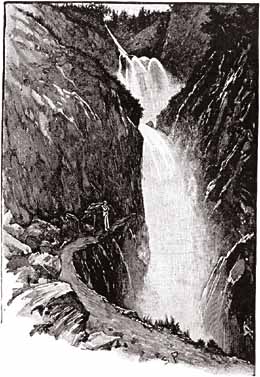|
"Books
are the quietest and most constant of friends; they are the most
accessible and wisest of counsellors, and the most patient of
teachers..."
Charles W. Eliot - The Happy Life - 1896
----------
D
conan doyle
S
shakespeare
sherlock holmes sir arthur conan doyle
Sir Arthur
Conan Doyle was born in Edinburgh in 1859 and died in 1930. He
was the nephew of 'Dickie' Doyle the artist, and was educated at
Stonyhurst, and later studies medicine at Edinburgh University
where the methods of diagnosis of one of the professors, Joseph
Bell, are said to have provided the idea for the methods of
deduction used by Sherlock Holmes.He first set up as a doctor at Southsea
and it was while waiting for patients that he first began to
write. He was a champion of those convicted of crimes they had
not committed, as witness his efforts in proving the innocence
of Oscar Slater; a sportsman; a flesh-and-blood detectice
himself, for whose help there were frequent demands; a physician
in the Boer War, a preacher, and a missionary. His greatest achievement
was, of course, his creation of Sherlock Holmes, who soon
attained an international status and constantly decoyed his
creator from work that he preferred. At one time Conan Doyle
killed him but was obliged by public protest to restore him to
life. Holmes was a rival who had so many of the characteristics
and experiences of Conan Doyle that he even adopted one of his
creator's friends, Dr. Watson, and turned him into once of the
famous characters of fiction. william shakespeare
William
Shakespeare was born to John Shakespeare and mother Mary Arden
some time in late April 1564 in Stratford-upon-Avon. There is no
record of his birth, but his baptism was recorded by the church,
thus his birthday is assumed to be the 23 of April. His father
was a prominent and prosperous alderman in the town of
Stratford-upon-Avon, and was later granted a coat of arms by the
College of Heralds. All that is known of Shakespeare's youth is
that he presumably attended the Stratford Grammar School, and
did not proceed to Oxford or Cambridge. The next record we have
of him is his marriage to Anne Hathaway in 1582. The next year
she bore a daughter for him, Susanna, followed by the twins
Judith and Hamnet two years later.
Seven years later Shakespeare is recognized as an actor, poet
and playwright, when a rival playwright, Robert Greene, refers
to him as "an upstart crow" in A Groatsworth of Wit. A
few years later he joined up with one of the most successful
acting troupe's in London: The Lord Chamberlain's Men. When, in
1599, the troupe lost the lease of the theatre where they
performed, (appropriately called The Theatre) they were wealthy
enough to build their own theatre across the Thames, south of
London, which they called "The Globe." The new theatre
opened in July of 1599, built from the timbers of The Theatre,
with the motto "Totus mundus agit histrionem" (A whole
world of players) When James I came to the throne (1603) the
troupe was designated by the new king as the King's Men (or
King's Company). The Letters Patent of the company specifically
charged Shakespeare and eight others "freely to use and
exercise the art and faculty of playing Comedies, Tragedies,
Histories, Inerludes, Morals, Pastorals, stage plays ... as well
for recreation of our loving subjects as for our solace and
pleasure."
Shakespeare entertained the king and the people for another ten
years until June 19, 1613, when a canon fired from the roof of
the theatre for a gala performance of Henry VIII set fire to the
thatch roof and burned the theatre to the ground. The audience
ignored the smoke from the roof at first, being to absorbed in
the play, until the flames caught the walls and the fabric of
the curtains. Amazingly there were no casualties, and the next
spring the company had the theatre 'new builded in a far
fairer manner than before'. Although Shakespeare invested
in the rebuilding, he retired from the stage to the Great House
of New Place in Statford that he had purchased in 1597, and some
considerable land holdings, where he continued to write until
his death in 1616 on the day of his 52nd birthday.----------
sherlock holmes
Sir
Arthur Conan Doyle created the character of Sherlock Holmes
in his first Holmes novel, a Study in Scarlet. Holmes was
the greatest detective of his time, known for his deductive
powers.
"His
very person and appearance were such as to strike the
attention of the most casual observer. In height he was
rather over six feet, and so excessively lean that he
seemed to be considerably taller. His eyes were sharp and
piercing, save during those intervals of torpor to which I
have alluded; and his thin, hawk-like nose gave his whole
expression an air of alertness and decision. His chin,
too, had the prominence and squareness which mark the man
of determination. His hands were invariably blotted with
ink and stained with chemicals, yet he was possessed of
extraordinary delicacy of touch, as I frequently had
occasion to observe when I watched him manipulating his
fragile philosophical instruments."
Dr.
Watson - A Study in Scarlet

While Sir
Arthur Conan Doyle is best known for his Sherlock Holmes
stories, that was not the work he valued the most. In fact
Conan Doyle once referred to them as 'an elementary form of
fiction'. He was very proud of his historical novels and
considered them some of his finest work.
While his
Sherlock Holmes stories were hugely successful Conan Doyle
was concerned that they were keeping him from more important
work. As early as 1891 he shared with his mother his
concerns about Holmes. "He takes my mind from better
things."
In his own
mind the matter was settled. Holmes must die. The only
question was how? Conan Doyle wanted a dramatic finish for
the great Sherlock Holmes. In 1893 Conan Doyle visited
Reichenbach Falls in the northern Swiss Alps. After seeing
the magnificent falls he decided the place would make a
worthy tomb for Sherlock Holmes.
----------
The
Adventure of the Final Problem was published in December of
1893 in the Strand Magazine. People were so upset that more
than twenty thousand of them cancelled their subscription to
the Strand Magazine.
mycroft holmes
Mycroft
was the older brother of Sherlock Holmes.
"Mycroft
Holmes was a much larger and stouter man than Sherlock.
His body was absolutely corpulent, but is face, though
massive, had preserved something of the sharpness of
expression which was so remarkable in that of his brother.
His eyes, which were of a peculiarly light, watery gray,
seemed to always retain that far-away, introspective look
which I had only observed in Sherlock's when he was
exerting his full powers."
Dr.
Watson - The Greek Interpreter
professor moriarty
Professor
Moriarty was the arch-enemy of Sherlock Holmes. They both
died in 'the Final Problem'.
"He
is the Napoleon of crime, Watson. He is the organizer of
half that is evil and of nearly all that is undetected in
this great city. He is a genius, a philosopher, an
abstract thinker. He has a brain of the first order. He
sits motionless, like a spider in the center of its web,
but that web has a thousand radiations, and he knows well
every quiver of each of them."
Sherlock
Holmes - The Final Problem
"He
is extremely tall and thin, his forehead domes out in a
white curve, and his two eyes are deeply sunken in this
head. He is clean-shaven, pale, and ascetic-looking,
retaining something of the professor in his features. His
shoulders are rounded from much study, and his face
protrudes forward, and is forever slowly oscillating from
side to side in a curiously reptilian fashion."
Sherlock
Holmes - The Final Problem
dr. john h. watson
Dr.
Watson was Holmes' friend and companion during many
adventures.
"I
had neither kith nor kin in England, and was therefore as
free as air, or as free as an income of eleven shillings
and sixpence a day will permit a man to be. Under such
circumstances, I naturally gravitated to London, that
great cesspool into which all the loungers and idlers of
the Empire are irresistibly drained."
Dr.
Watson - A Study in Scarlet
|

